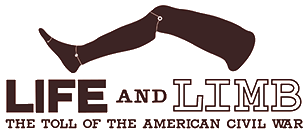
Class 5: Trauma: The Wounds that Would Not Heal
Introduction:
This class develops the students’ exploration of the issues raised in Unit 2 (Class 3 and Class 4) by exploring the impact of combat-induced stress on soldiers and on those treating them. S. Weir Mitchell’s famous fictional account of a Civil War amputee, along with Lisa Herschbach’s analysis of this ‘clinical fiction,’ provides an entry into a deeper consideration of the psychological impact of the war, one that Eric Dean’s work, in particular, has proved seminal in highlighting and which historians are just beginning to probe in more depth. The two examples here, by Frances Clarke and Jeffrey McClurken, consider the emotional impact of warfare on soldiers in the Union and Confederacy respectively.
Readings:
Primary:
Mitchell, S. Weir. “The Case of George Dedlow.” In The Atlantic Monthly 18, No. 105 (July 1866): 1-11. Available online at //memory.loc.gov/ammem/ndlpcoop/moahtml/title/lists/atla_V18I105.html (accessed 3/1/2011).
Secondary:
Clarke, Frances. “So Lonesome I Could Die: Nostalgia and Debates Over Emotional Control in the Civil War North.” In Journal of Social History 41, no. 2 (Winter 2007): 253-282.
Dean, Jr., Eric T. Shook Over Hell: Post-Traumatic Stress, Vietnam, and the Civil War. Cambridge, Mass.: Harvard University Press, 1997, Chaps. 5-7.
Goler, Robert I. “Loss and the Persistence of Memory: ‘The Case of George Dedlow’ and Disabled Civil War Veterans.” In Literature and Medicine 23, no. 1 (Spring 2004): 160-183.
Herschbach, Lisa. “True Clinical Fictions”: Medical and Literary Narratives from the Civil War Hospital.” In Culture, Medicine and Psychiatry 19, no. (1995): 183-205.
McClurken, Jeffrey W. Take Care of the Living: Reconstructing Confederate Veteran Families in Virginia. Charlottesville and London: The University of Virginia Press, 2009, Chap. 5.
Discussion Questions:
- From the evidence of ‘The Case of George Dedlow’ and S. Weir Mitchell’s non-fictional work, what issues were beginning to come to the fore during the Civil War regarding not just the effects of warfare on those who fought but of reactions to physical and mental trauma more generally?
- Were issues of ‘emotional control’ specific to the Civil War North?
- To what extent do you think the Civil War informs modern understandings of combat stress and to what extent are historians simply reading backwards from Vietnam? Is a comparison of these two very different wars either valid or valuable in terms of how modern society deals with combat stress?


